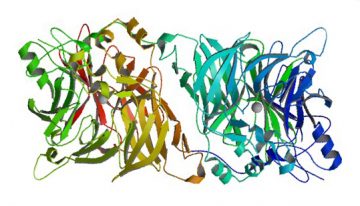 By Bronwyn Lyons, PhD Student, Strynadka Lab
By Bronwyn Lyons, PhD Student, Strynadka Lab
RPE65-mediated inherited retinal dystrophy leads to severe deterioration of vision and complete blindness in early adulthood1. A small subgroup of patients, approximately 1000 people in the United States2, have mutations in both paternal and maternal copies of the RPE65 gene that encodes retinoid isomerohydrolase, an enzyme involved in generation of the chromophore, 11-cis retinal. This biallelic mutation has a very poor prognosis and is considered the most severe of inherited retinal dystrophies.
At the beginning of 2018, Luxturna, developed by Spark Therapeutics, was approved by the Food and Drug Administration (FDA) for treatment of RPE65-mediated inherited retinal dystrophy2. Luxturna is the first targeted gene therapy approved in the US, representing a huge milestone in medical care. Through injection under the retina of each eye, adeno-associated virus introduces a functional copy of RPE65. This allows the eye to regenerate the 11-cis retinal chromophore that is required for normal vision2. Follow-up of participants in the Phase III trial showed that 27 of 29 patients regained their vision over the first year after treatment; 21 were able to complete an obstacle course in low light3. An article about 13-year-old Jack Hogan, the first patient to receive Luxturna after FDA approval, can be read here.
But, with the increasing cost of bringing a therapeutic from the laboratory to FDA approval (approaching $1-2 billion USD4) and with Luxturna only offering treatment to a small proportion of retinal dystrophies, how much does a single treatment cost? Treatment of both eyes costs $850,000 USD ($1.1 million CAD), not including the cost of travel/secondary treatment/hospital care! Does this hefty price tag spell disaster for Luxturna as it did for the first gene therapy agent from UniQure, Glybera? Glybera was licensed in Europe in 2012 for treatment of lipoprotein lipase deficiency, an extremely rare condition. However, at a cost of over a million USD, Glybera was purchased only once, FDA approval was not sought and Glybera met its demise in the pharmaceutical market5.
To encourage sales of Luxturna, Spark Therapeutics is offering rebates for patients who do not respond within a reasonable time post-treatment6. The company is also working closely with insurance providers to reduce costs and allow the patients to pay for the treatment in instalments. However, a million dollars paid through instalments could still take a lifetime to pay off. The high price tag of these first two gene therapy treatments is worrying — if too few patients can afford Luxturna, will a domino effect ensue, blocking further advancements in development of other gene therapies? Hopefully, the benefits of Luxturna will inspire a wave of novel therapies for other genetic disorders. Spark therapeutics, in collaboration with Pfizer pharmaceuticals, is already expanding Phase I and II trials of a second gene therapy for treatment of the inherited bleeding disorder, Hemophilia B7.
- Bainbridge, J., et al. (2015) Long-term effect of gene therapy on Leber’s congenital amaurosis. Engl. J. Med. 372(20): 1887-1897.
- https://www.fda.gov/NewsEvents/Newsroom/PressAnnouncements/ucm589467.htm
- Russell, S., et al. (2017) Efficacy and safety of voretigene neparvovec (AAV2-hRPE65v2) in patients with RPE65-mediated inherited retinal dystrophy: a randomised, controlled, open-label, phase 3 trial. The Lancet. 390: 849-860.
- http://blogs.sciencemag.org/pipeline/archives/2017/10/18/drug-development-costs-revisited
- https://www.technologyreview.com/s/601165/the-worlds-most-expensive-medicine-is-a-bust/amp/
- http://ir.sparktx.com/news-releases/news-release-details/spark-therapeutics-announces-first-their-kind-programs-improve
- https://www.pfizer.com/news/press-release/press-release-detail/spark_therapeutics_and_pfizer_amend_license_agreement_for_investigational_spk_9001_in_hemophilia_b



